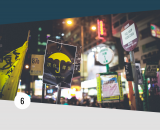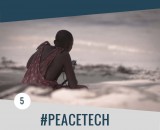The Power of Storytelling through Film: From Liberia to the World
Let me tell you a story.
It begins in Liberia in 2003, when a civil war between rebel groups and President Charles Taylor’s government served as a constant source of fear and devastation since fighting began in 1999. In the midst of this violence, a group of Muslim and Christian women, unaffiliated with any government or NGO, gathered to make a commitment to rise above their different tribal, ethnic, and political allegiances to fight for one thing: peace.
In April of that year, the women found a place along the highway in Monrovia that Taylor’s motorcade passed each day on his way to the presidential palace—a place where they could not be ignored. For days, the women sat in the pounding equatorial sunshine and drenching rain, praying, singing and fasting in protest of the war. The women knew they were risking their lives in this effort: Taylor was dismissive of them, and stated publicly that if his own mother had been among the protestors, he would kill her.
For days, the women sat in the pounding equatorial sunshine and drenching rain, praying, singing and fasting in protest of the war.
But the women refused to back down, and their patience gave them strength. Eventually, members of their group were able to meet with both Taylor and the rebel leaders and persuaded them to hold the peace talks in Ghana. And they didn’t stop there. The women traveled to Ghana themselves to attend the talks, where their presence—along with the international press—reminded the negotiating parties that their work was being monitored, and that the international community would not avert its eyes until peace was agreed upon.
Nevertheless, progress was fitful and slow. One day, when the peace talks had reached a standstill, the Liberian women linked arms and peacefully barricaded the exits with their bodies, effectively taking the proceedings hostage until an agreement was reached between Taylor and the rebel leaders. Many now credit this moment as the one that forced the participants to arrive at the agreement that still holds today. In honor of the women’s contribution to peace, a prominent spokeswoman of the movement, Leymah Gbowee, was awarded a Nobel Peace Prize, which she shared with Liberia’s newly-elected—and female— president, Ellen Johnson-Sirleaf.
When I learned about this story, I was amazed. Yet I was equally amazed that their accomplishments were so unknown in the wider world. And I thought: what can I do? Though I’d never made a film before, I took a deep breath and made a commitment, along with my filmmaking partner Gini Reticker, to tell the story of these women in a film. I wanted to keep their story from vanishing—as so many brave women’s stories do—amid the noise of a global media that often seems drawn only to stories and images of men, fighting. When we finished that film, which we called Pray the Devil Back to Hell, I hoped that it would keep the efforts of Leymah and her fellow peacebuilders from being forgotten, and that it might inspire someone, somewhere, not to give up fighting for peace in the face of terrible odds. But I didn’t necessarily think it would lead to action.
Suffice to say I was wrong. I’ve screened Pray the Devil Back to Hell in 32 different countries, and I’ve been astonished again and again at the response to the film; it was as if it arrived to fill an urgent need. About fifteen minutes into a typical Q&A following a screening of the film, there is usually a woman who stands and says, “How can we step up the way those women did?”
That question has translated into action time and time again:
In Tblisi, Georgia, after a screening of Pray, the women in the audience wrote a “position statement” calling upon women to come together under the banner of peace. The next week they took that statement into the conflict zones in Abkhazia and Ossetia, where it was signed by women from all ethnic groups—groups that had been characterized as hopelessly factionalized.
(Photo credit: “Adala Center for HR (1)”) Used with permission, courtesy of Peace is Loud.
In Sri Lanka, the Association of War Affected Women credit the film with helping them rededicate themselves to demanding their rightful voice in the rebuilding process after their own civil war. In the four years since they saw the film, they have trained thousands of women from more than 25 districts to run for political office.
And in the Democratic Republic of Congo, one man, memorably, after the screening, said, “I always thought women were kind of worthless, but now I feel sort of differently about this.” That was five years ago. And just last year in the DRC, the founder of the NGO Synergie de Femmes Pour Les Victimes de Violences Sexuelles, Justine Masika Bihamba, drove through the country with a mobile cinema, bringing Pray to almost 12,000 people throughout the North Kivu province, to encourage women to run for local office in advance of the national elections.
I don’t mean to say that my film works miracles, or that it suddenly inspires people to want peace who didn’t already want it.
But it seemed to help catalyze forces that were already building, and for a fairly simple reason, I think. Through the film, the Liberian women who helped end a war were able to tell other women that they were not alone—that there were others who understood their suffering. And that there had been a moment, not so long ago, in a place where all hope seemed lost, when the efforts of ordinary women opened a path to a more peaceful world. Bringing Pray the Devil Back to Hell into the world taught me that the story of the women of Liberia was more powerful than I, or they, ever imagined it could be.
(Feature Photo Credit: “Pray the Devil Back to Hell3” used with permission, courtesy of Peace is Loud)

